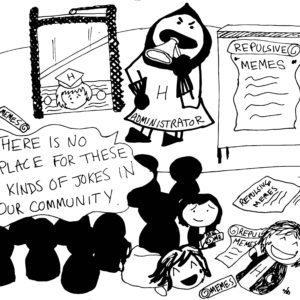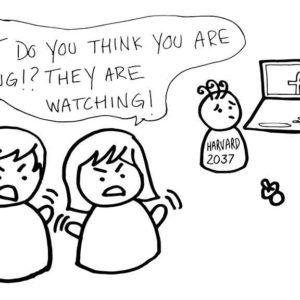
It is not always easy to predict what will cause a scandal. When Harvard announced that “unofficial clubs” were banned, ostensibly killing freedom of association not only were the crickets silent, but they may as well have migrated to Australia.
But they showed up when James Damore got fired for his Google memo, and they chirped their summer cricket song as loudly as they could. Every publication, be it right-wing or left-wing, made a fuss—The National Review, The Weekly Standard, even CNN.
From a management perspective, his firing does actually make sense. He created an immense company headache. Maybe if his memo championed a more PC cause, he too would have been championed, not fired. And that would have been a terrible double-standard indeed–if this double-standard could be proven, that would make for an exciting story. But in this scenario, he did act unprofessionally and he did show bad judgment. If Damore had tried this stunt at a company known for its ruthless politicking, such as Goldman Sachs, he would have been fired instantly for his social clumsiness, if for nothing else, and nobody would have batted an eye. Google is no different from Goldman Sachs. Although it tries to play up its playful image, it is intensely professional as an organization, with ludicrous amounts of power. At its top, I am sure its internal politics could serve as plot points for Game of Thrones.
It makes sense why conservatives rallied: a fear-based culture arises when people are fired for expressing political opinions. Damond was not even fired for something fringe. He was fired for a mainstream opinion. (Yes—that men and women are biologically and psychologically different in some ways is a mainstream view.) The extent of the difference and how this should affect policy has been debated (for instance, should states fund same-sex classrooms?), but the view is still mainstream.
An even bigger issue for concern: this is not some small startup. This is Google we are talking about. If Google is so left-leaning that it fires moderately conservative employees, then is it biased in other ways as well? Does it prioritize liberal views in its searches? Does it interfere with recommended content? If there was evidence that this sort of manipulation were going on, this would be cause for astronomic concern.
Then there is the cultural issue: People are already afraid of the PC police. For people concerned about the current political climate, Damond’s firing is bad. If people keep losing jobs over their politics, nobody will say anything. This is bad for morale in that it creates a sterile workplace culture. But this is also bad because people will not bring up problems with the organization. (That is ultimately what Damond was trying to do with his memo. He was not seeking attention, he was seeking to improve Google.) When powerful organizations are mismanaged, enormous catastrophes happen that have consequences well beyond the organization (See: Enron).
Now, what did Damond actually say in his memo? And was it reasonable?
He did make some good points. It may well be a pipe dream—as he says—to reach 50% women in tech (especially quickly), and if people aren’t allowed to say this plausible idea without getting in trouble, then that is indeed a toxic environment.
Why does he not think we will reach 50% women in the near future? His argument is simple: women are perfectly capable of performing in technical fields at the highest level. But even if we do end bias against women, men will still be much more likely to pursue high-status, high-paying careers (such as in tech or finance) over everything else. When a man’s entire social value is based on his wealth and competence, he is willing to forgo comfort, family, and life balance for pay and advancement. We see this effect not just in men’s desperation to pursue the highest paying professions, but in the lowest as well: men form the bulk of the work force in dangerous professions like mining, because they are willing to risk their lives to earn the money to support their families. Meanwhile, highly gratifying, but low-paying professions like teaching are largely filled by women. I am sure that if teaching kindergarten became highly prestigious and highly lucrative, men would compete viciously for positions and lower the number of women.
This idea by itself—that men are trained by society to fight viciously for money and power in a way that women are not—is generally uncontested and is enough to shirk the idea that a company is only unbiased once it has reached 50% women. And Damore is correct when he says that if people are not allowed to talk about this, then Google cannot come up with the most effective diversity strategies.
He could have stopped there. Point made. Everything fine.
If this was all that he said, I would have liked his memo.
But he kept going into the slippery territory of biological sex differences, a territory resembling the Everglades; the occasional specialist can navigate it with grace and style, but most people get chewed up by angry crocodiles. He repeats that he values diversity. I have no reason to doubt him when he says that he is not racist or sexist.
But still, the memo comes off as tone deaf and a bit too interested in biological differences. He cites social science without actually citing any social science, instead listing clichés—that women want empathy and cooperation more than results, that women are worse at handling stress. Some of this has backing in social science—but he cites none of it and leans too much on stereotypes and conventional wisdom.
His proposed solutions to his listed problems range from reasonable to downright insulting. He suggests Google make the workplace more “collaborative” to make it more attractive to women. This just sounds silly: tech is already very collaborative, and who says this would actually make women happier? He suggests that Google cut every single diversity initiative in place. This is insulting to his colleagues who have spent much more time than he has thinking about them, and measuring if they have been helpful or not.
Not to mention, the memo was not thoughtful and thorough enough for to have been sent to the Diversity team that he probably meant to target, let alone many company email threads. Damond clearly did not have enough people read his memo and debate his points before sending it out. For example, he addressed none of the reasons why Google started the initiatives in the first place (the strong suspicion that capable, interested women are discouraged from joining the industry, and that Google is losing talent because of this). He clearly did not ask any women what vibe they got from the memo, or what changes they themselves would like to see at the company. This shows a stubbornness and single-mindedness that is undesirable in an employee.
And probably most important as far as his bosses are concerned, he suggested that current female and minority employees were held to a lower standard than the white men during hiring. So he created not just an external PR scandal, but an internal quandary impossible to solve: Now that he said this, how can managers assign women or minorities to work with him?
To sum up: This is more nuanced than just a small guy being quashed by the big man, more than just a guy being fired for saying what he thinks.
It is fine that conservatives are leaping to support this guy. This is not the first time that people supported a less-than-ideal victim for a greater cause. But it is disquieting that too often conservatives stay quiet on some enormous conservative issues, and then zealously defend petty things that—by the way—also happen to make them look shortsighted, if not outright racist and sexist.
For example—how can Conservatives rally in flocks to speak up for Damond, but stay quiet on police brutality—the biggest abuse of state power in our time? In the 2016 Republican National Convention, not a single word was said even as riots broke out. For some reason conservatives all forgot that state power against the individual, government workers gunning down helpless people in the street, was a huge conservative faux pas. Liberals have their sacred cows, and as Google proved, “diversity” is one of them. But conservatives have them too. When marijuana users are locked up en masse, conservatives are at church worshiping the sacred cops.
Conservatives—rally for Damore. Defend free speech and battle nonsensical diversity programs. But rally for everything else too. Because inconsistency is what forces conservatism to look racist, sexist, and generally insane. Principled conservatism means nothing without principles. Principles mean nothing without consistency.




